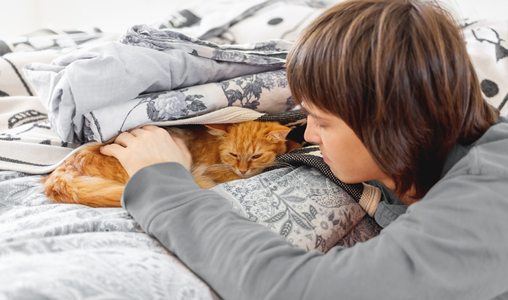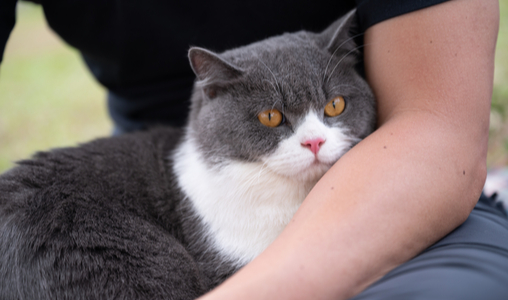
Stress in cats can cause serious health problems. The stress may also exacerbate existing health conditions and create behavioral problems, such as eliminating outside the litter box, aggression to other cats or to you, and depression.

When a cat’s behavior suddenly changes, the first thing you should do is visit the vet to rule out a medical problem, such as a bladder infection that is preventing the cat from using the litter box, and urinating all over the house.
The next thing is to check the environmental behavioral aspect.
Cats don’t react well to changes when they aren’t in control of the situation and this may lead to stress. Changes like moving house, a new baby at home, a new cat or dog in the family, may have an adverse effect on the cat. Even small events may be a trigger. Things you may consider insignificant and that you think your cat won’t notice, may be a stressor for the cat.

• A new baby at home – A new baby at home makes a lot of noise and demands a lot of attention from the cat’s perspective. Plan ahead and make arrangements that include your cat as well. You can help the cat cope and perhaps prevent the stress due to a new addition to the family. A proper introduction and bonding will calm the cat.
• Moving – Moving can be a very unpleasant experience for the cat. After all, he didn’t choose it and didn’t prepare for it emotionally like we do when we decide to move, so he may suddenly find himself in an unfamiliar territory with unfamiliar smells, new people in his space and piles of boxes…most cats will be stressed during the days around the move. For the most part, the cat should stay in a closed room until the movers finish removing all your belongings and leave the house, and then you can take the cat and bring him into a room in the new house until the movers finish up there. The adjustment really depends on the cat’s nature, distance from the previous house, and additional factors, which is why it’s important to seek advice.
• Change of routine – If you started a new job that keeps you away from home for longer, you should prepare and make sure the cat isn’t alone for hours on end. Although cats are independent animals, they still require a lot of interaction and stimulation. Being at home alone, all day every day, may adversely affect the cat and cause more stress and behavioral problems. Moreover, organize activities and stimulation for your cat so that he can expend energy during the day when you are at work. It’s important to vary activities daily.
• Loud music – One evening, a nice woman called me and told me that for the past month her cat has only been walking on high surfaces. In other words, from the table to the kitchen counter, back to the table, to the sofa, and so forth…This didn’t bother them until the cat started peeing from up high!! When I arrived at the meeting and probed further to understand all the details, it turned out that their teenage son had started listening to really loud music, to be more specific, rock music at a super high volume where the bass reverberated throughout the floor. This really stressed the cat out to the point that she preferred not to walk on the floor. The son agreed to using headphones to improve the cat’s quality of life and the family’s quality of life improved shortly thereafter.
• Non-neutered cats – Aggression to you or to another cat at home may be related to cats roaming in the vicinity of the house. Often, when a cat who is house-bound (especially if he isn’t neutered) sees from the window another cat walking around near the house, he will get frustrated at not being able to get out and chase the other cat away to defend his territory. In response to this frustration the cat may suddenly attack whoever is closest to him at the moment.
The first step is to understand what the stressor is, be it one of the above causes or something else, and then to address the problem specifically and in a way that is suited to you and your cat. In any case, there are a few actions you can take, such as:
• If you can remove the stressor, do it and save your cat from distress. For example, if you are used to listening to very loud music, change the habit. If your cat’s litter box doesn’t work for him, find one that does.
• You might want to give your cat food that contains medicinal plants like chamomile and passionfruit, known for their soothing properties, which can help reduce the cat’s stress.
• Pheromones in a spray or electrical device may, in some cases, help to reduce stress. This product mimics the pheromones that a cat secretes to mark territory and results in feeling secure.
Along with all these, it’s very important to work with the cat on a behavioral level and help him cope with the stressor. For example, if you adopted another cat and the veteran cat is stressed about it, it’s important to build a good and proper relationship between them. There are ways to do this so the cat enjoys the process and you achieve the goal.
And don’t forget that the behavioral work is the key to change. You can, of course, seek professional behavioral advice.
To conclude, stay calm. Regardless, this will help your cat better cope with the situation.